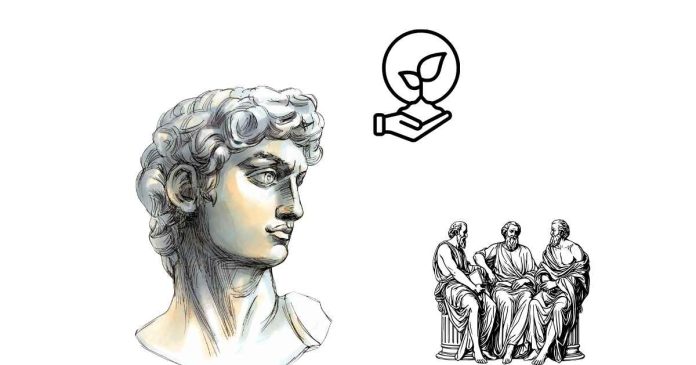The term “Greek” is widely recognized and used across the world today, referring to the people, language, and culture of Greece. But have you ever wondered where this term originated from and how it became so deeply embedded in various languages and cultures? To understand the origins of the word “Greek”, we must explore its etymological history and the historical developments that led to its modern usage.
1. The Etymology of ‘Greek’
The term “Greek” in English derives from the Latin word “Graecus”, which itself was used to refer to the people of Greece. The Latin “Graecus” came from the Greek word “Graikoi” (Γραικοί), which was used by the Greeks to describe themselves. The exact reason why the Greeks chose this particular term is not entirely clear, but it is believed to refer to an ancient tribe called the Graikoi who lived in the western part of what is now Greece.
- Greek term: Graikoi (Γραικοί)
- Latin term: Graecus
- Modern English term: Greek
The name “Graikoi” was likely used to refer to a specific tribe or group of people in the early days of Greek civilization. However, over time, the term was adopted more broadly to refer to all Greek-speaking people, and it became the standard term used by both the Romans and the wider world.
2. The Greek Self-Identification: ‘Hellenes’
Interestingly, the people of Greece did not call themselves “Greeks” or “Graikoi”. Instead, they identified themselves as “Hellenes” (Έλληνες), which comes from the word “Hellas” (Ελλάς), the name the ancient Greeks used for their homeland. According to Greek mythology and early historical texts, the name “Hellenes” was derived from Hellen, the mythological ancestor of the Greeks. The term “Hellenes” was used to describe all Greek-speaking people, regardless of their specific city-state or region.
- Greek self-identification: Hellenes
- Greek name for the country: Hellas
- Modern term for Greece: Greece (derived from “Graecus”)
The contrast between how Greeks identified themselves as Hellenes and how outsiders referred to them as Greeks (or Graikoi) can be traced back to the interactions between ancient Greek city-states and foreign peoples.
3. The Roman Influence
The widespread use of the term “Graecus” by the Romans helped solidify the name “Greek” in many languages. During the Roman Empire, which dominated the Mediterranean world, the Romans came into contact with Greek-speaking peoples and their culture. Greek culture, language, and philosophy had a profound influence on Roman society, particularly after the Romans conquered Greece in 146 BCE. As the Romans used the term Graecus to refer to the Greeks, it spread throughout the Roman Empire and influenced other languages.
- Roman use: Graecus for the people of Greece and their culture.
- Cultural significance: Greek culture heavily influenced Roman arts, literature, and philosophy.
As the Latin-speaking Romans spread their empire, the term “Graecus” became the foundation for words like “Greek” in English and other European languages, such as “Griechisch” in German, “Grec” in French, and “Grego” in Spanish.
4. The Spread of the Term in Modern Languages
With the fall of the Roman Empire and the rise of the Byzantine Empire (Eastern Roman Empire), which was Greek-speaking, the term “Greek” continued to be used in both the Eastern Mediterranean and the wider European world. As trade, exploration, and cultural exchanges continued over centuries, the name “Greek” came to be universally recognized across various languages, especially in reference to the Greek language, culture, and people.
In the Byzantine Empire, the people identified as Romans (Ρωμαῖοι or “Romaioi”), but the term Greek (or its equivalent in other languages) was still commonly used to describe the language and culture of the Byzantine world. This dual identity — calling themselves Romans while the rest of the world referred to them as Greeks — persisted for many centuries.
5. The Modern Usage of ‘Greek’
Today, “Greek” is used in a variety of contexts:
- Greek people: Refers to the citizens of modern-day Greece or those of Greek heritage.
- Greek language: Refers to the language spoken in Greece, including its ancient, medieval, and modern forms.
- Greek culture: Encompasses the rich traditions, arts, philosophy, and history of Greece that have had an immense influence on the development of Western civilization.
- Greek cuisine: The culinary traditions of Greece, which include famous dishes such as moussaka, souvlaki, and baklava.
Conclusion
The origin of the term “Greek” is rooted in ancient history, beginning with the Latin word “Graecus,” which the Romans used to describe the people and culture of Greece. The Greeks themselves referred to their homeland as Hellas and identified as Hellenes. However, over time, the Latin term “Graecus” became widely adopted across different languages, and it continues to be used today.
The name “Greek” has traveled through centuries of cultural exchange and historical events, from ancient Rome to the modern era. Whether referring to the people, language, culture, or cuisine, the term has evolved into a symbol of a rich and enduring civilization that has had an indelible impact on the world.


